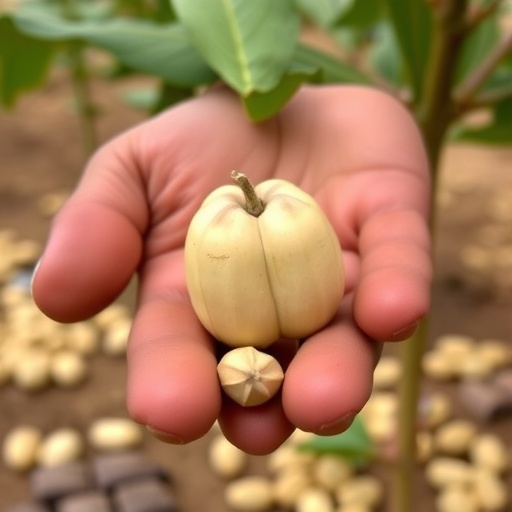Groundnut, also known as peanut, is a vital cash crop across various regions of Africa, contributing to the livelihoods of millions. However, it faces severe threats from a plethora of diseases that jeopardize crop yields and, consequently, the economic stability of farming communities. Recent research conducted by Awoke et al. highlights the current agricultural technologies and practices tailored for groundnut disease management in Africa. This comprehensive review details not only the challenges posed by these diseases but also offers insights into innovative solutions that farmers can employ.
The primary diseases that afflict groundnut crops include fungal infections like leaf spot and rust, bacterial wilt, and viral diseases such as the groundnut rosette disease. These pathogens not only cripple yield potential but also impact the quality of the harvested nuts. Farmers in sub-Saharan Africa are especially vulnerable, given their limited access to advanced agricultural tools and knowledge systems. The review by Awoke and colleagues emphasizes the urgency for integrated disease management approaches that are both efficient and sustainable.
One of the groundbreaking strategies proposed is the implementation of resistant cultivars. The scientists argue that breeding programs should focus on developing and disseminating varieties that can withstand the most prevalent diseases. Research institutions across Africa are already making strides in this area, identifying genetically superior strains that promise not only higher yields but also reduced dependency on chemical interventions.
Chemical treatments remain a critical component of disease management, yet their indiscriminate use poses environmental and health risks. The study advocates for the responsible use of fungicides and bactericides, recommending an integrated pest management (IPM) framework. This methodology combines biological, cultural, and mechanical controls with chemical inputs to reduce disease incidence holistically. By educating farmers about the optimal application of these products, it’s possible to mitigate harm while maximizing efficacy.
Innovative agricultural practices, such as crop rotation and intercropping, have also gained traction as non-chemical alternatives to disease management. The review outlines how these practices disrupt the life cycles of pathogens and can enhance soil health. Furthermore, incorporating legumes and other complementary crops not only aids in maintaining soil fertility but can also create a protective buffer against disease spread.
In the context of climate change, the resilience of crop varieties is paramount. The researchers underscore the importance of adaptive strategies that consider changing climatic conditions, which may exacerbate disease prevalence. Climate-smart agriculture, including practices such as optimizing planting times and employing agroforestry, can provide groundnut farmers with an edge in combating diseases that thrive under changing weather patterns.
Education and training of farmers cannot be overstated. The review notes that extension services play a crucial role in disseminating knowledge about groundnut diseases and effective management practices. Bridging the gap between research and practical application requires concerted efforts to equip local farmers with the necessary skills and information. Workshops, field demonstrations, and participatory research approaches can foster greater involvement and understanding among farmers.
Fungi-specific biocontrol agents have emerged as a promising alternative to traditional chemical methods. The review indicates that fostering relationships between bio-pesticide producers and farmers can significantly enhance disease management efforts. By leveraging naturally occurring organisms to control harmful pathogens, farmers can reduce the reliance on synthetic chemicals while maintaining crop health.
Adoption of precision agriculture technologies offers another layer of sophistication in disease management. The integration of data analytics, remote sensing, and artificial intelligence can empower farmers to make informed decisions regarding disease risks and management strategies. The review highlights how investing in digital platforms that provide real-time data can facilitate proactive measures against disease outbreaks.
The review also presents case studies illustrating successful disease management strategies across various African nations. By learning from pilot programs that have effectively reduced groundnut disease incidence, stakeholders can develop region-specific interventions that address unique challenges faced by farmers. These success stories not only serve as templates for others but also raise awareness about the importance of community-driven approaches in agricultural research.
Collaboration among researchers, policymakers, and farmers is essential for creating a supportive ecosystem for disease management. The review suggests establishing public-private partnerships that can enhance research funding and establish better supply chains for disease-resistant seed varieties. These collaborations can also facilitate knowledge exchange, driving innovation in groundnut production techniques.
The economic implications of effective groundnut disease management extend beyond local farming communities. As African nations strive for food security and agricultural competitiveness on a global scale, addressing the challenges of groundnut diseases will be crucial. Enhanced productivity can contribute to regional economies, improve food systems, and drive sustainable development goals.
As the findings of Awoke et al. gain traction, it is imperative for stakeholders to rally behind evidence-based strategies that prioritize sustainable practices. The emphasis on research-driven recommendations provides a hopeful outlook for future groundnut production in Africa. The intersection of traditional knowledge and modern science holds the potential to revolutionize how farmers approach disease management, ultimately leading to a more resilient agricultural landscape.
In summary, the review by Awoke and colleagues serves as a clarion call for the integration of innovative agricultural technologies and practices in managing groundnut diseases. By investing in resistant cultivars, sustainable agricultural practices, education, biocontrol measures, and advanced technology, Africa can cultivate an environment where groundnuts flourish, safeguarding the livelihoods of countless farmers. The road ahead is challenging, but with collaborative efforts, the vision of resilient groundnut farming can become a reality.
Subject of Research: Groundnut diseases management in Africa.
Article Title: Agricultural technologies and practices for groundnut diseases management in Africa: a review.
Article References:
Awoke, R.W., Okello, D., Mafurah, J. et al. Agricultural technologies and practices for groundnut diseases management in Africa: a review.
Discov Agric 3, 206 (2025). https://doi.org/10.1007/s44279-025-00377-3
Image Credits: AI Generated
DOI:
Keywords: groundnut, disease management, Africa, agricultural technology, sustainable practices.
Tags: agricultural technologies for disease controlbacterial wilt in groundnutschallenges in groundnut farmingcrop yield improvement in Africaeconomic impact of groundnut diseasesfungal infections in peanutsgroundnut disease management in Africainnovative agricultural practices for peanutsintegrated disease management strategiesresistant cultivars for groundnutssustainable farming solutions for peanutsviral diseases affecting groundnuts





